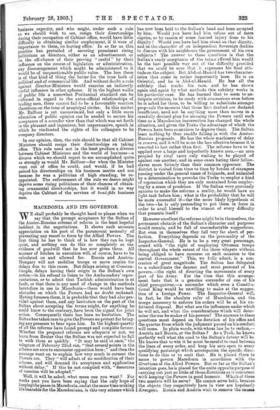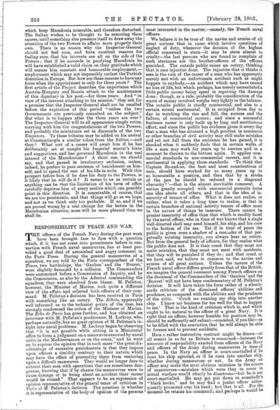• MACEDONIA AND ITS GOVERNOR.
E shall probably be thought hard to please when we YV say that the prompt acceptance by the Sultan of the Austro-Russian scheme of reform is the least hopeful incident in the negotiations. It shows, such accurate appreciation on his part of the paramount necessity of preventing any resort to force by the Allied Powers. The first thing he has to think of is how they can be kept quiet, and nothing can do this so completely as the evidence of goodwill that he has now given them. All manner of bitches in execution will, of course, have to be calculated on and allowed for. Russia and Austria- Hungary will not mobilise troops on move armies for delays due to this cause. But delays, arising at Constan- tinople, delays having their origin in the Sultan's own action—in his refusal to listen to the Ambassadors' repre- sentations, or to admit that Turkish administration is at fault, or that there is any need of change in the methods heretofore in use in Macedonia—these would have been obstacles on which the Powers had no doubt reckoned. Having foreseen them, it is probable that they had also pro- vided against them, and any hesitation on the part of the Sultan about accepting the terms might, for anything he could know to the contrary, have been the signal for joint action. Consequently there has been no hesitation. The Sultanhas taken care to give the Powers no pretext for bring- ing any pressure to bear upon him. In the highest quarter of all the reforms have found prompt and complete favour. Whether the proposed reforms are adequate or not, we learn-from Reuter that the Sultan was not expected to fall in with them so quickly. " It may be said at once," the telegram of February 22nd ran, " that several points in the scheme are sure to encounter opposition here ; " and then the message went on to explain how very much in earnest the Powers are. They " will admit of no modification of their scheme, and will demand its acceptance and application without delay." If this be not complied with, " Measures of coercion will be adopted." Well, it will be asked, what more can you want ? For weeks past you have been saying that the only hope of keepingthe peace in Macedonia, and at the same time making life bearable for the Macedonians, is this very scheme which has now been held to the Sultan's head and been accepted by him. Would you have had him refuse out of mere caprice, or by reason of some fancied injury done to his dignity? Would you have had him stand on that dignity, and in the character of an independent Sovereign decline to discuss with his neighbours the government of his own subjects ? The answer to these questions is that the Sultan's ready acceptance of the terms offered him would be the best possible way out of the difficulty provided that we could be sure that it expresses his final atti- tude on the subject. But Abd-ul-Hamid has two character. istics that come in rather importantly here. He is an Oriental, and he is Abd-ul-Hamid. He has all the subtlety that marks his race, and he has shown again and again by what methods this subtlety works in his particular case. He has learned that to seem to an- ticipate criticism, to be ready with concessions even before he is asked for them, to be willing to substitute stronger proposals the moment that those first drafted are declared insufficient, need not be anything more than moves in a carefully devised plan for amusing the Powers until such time as a Maeedoman insurrection has changed the whole situation, and given the Turks the advantage of which the Powers have been so anxious to deprive them. The Sultan loses nothing by thus readily falling in with the Austro- Russian proposals. He has the whole machinery of delay in reserve, and it will be none the less effective because it is resorted to last rather than first. The reforms have to be applied over a large and imperfectly known area,—an area peopled by rival races only waiting to be played off against one another, and in. some cases hating their fellow- slaves more bitterly than their common oppressor. The district is visited from time to time by hordes of strangers passing under the general name of brigands, and animated by a determination to provoke the Turks to employ a kind of repression which they are only restrained from employ. ing by a sense of prudence. If the Sultan were genuinely anxious to make the reforms a reality, he would have no light task before him ; what is the probability that he will be more successful if—far the more likely hypothesis of the two—he is only pretending to put them in force in order to avail himself to the utmost of every difficulty that presents itself ?
However excellent the reforms might be in themselves, the permanent obstacle of the Sultan's character and purposes would remain, and be full of uncomfortable suggestions. But even in themselves they fall very far short of per- fection. Everything depends on the personality of the Inspector-General. He is to be a very great personage, armed with " the right of employing Ottoman troops throughout the whole extent of the three vilayets without being obliged to have recourse on each occasion to the. central Government." This, we fully admit, is a con- cession of great magnitude. The Sultan has delegated to a subordinate the dearest and most personal of his powers,—the right of directing the movements of every part of his Army. For the time that this arrange- ment lasts that is a genuine surrender of one of his chief prerogatives,—a surrender which even a Constitu- tional King would be unwilling to make at the sugges- tion of a foreign Power. The Inspector-General will, in fact, be the absolute ruler of Macedonia, and the troops necessary to enforce his orders will be at his un- fettered disposal. But what are the influences under which he will act, and what the considerations which will deter- mine the use he makes of his powers? The answers to these questions must depend on the duration of his office and the quarter from which the judgment passed on his conduct will come. In plain words, with whom has he to reckon,— Austria and Russia, or the Sultan ? As a Turk, he knows perfectly well what the road to the Sultan's favour will be. He knows that to win it he must be careful to read between the lines of every order, and keep his ears open to every qualifying postscript which accompanies the specific direc- tions to do this or to omit that. He is placed there in name to govern Macedonia in accordance with the directions of the Allied Powers. But so far as the Sultan's intention goes, he is placed for the quite opposite purpose of carrying out just so little of those directions as is consistent with keeping the Powers in good humour. Which of these two masters will he serve? He cannot serve both, because the objects they respectively have in view are hopelessly divergent. Russia and Austria wish to remove the causes which keep Macedonia miserable, and therefore disturbed. The Sultan wishes to be thought to be removing these causes, until something else presents itself to draw away the attention of the two Powers to affairs more properly their own. There is no reason why the Inspector-General should not feel sure, and have excellent reasons for feeling sure, that his interests are all on the side of the Powers ; that if he succeeds in pacifying Macedonia he will have established a valid claim on their gratitude which will ensure him constant and honourable employment,— employment which may not impossibly outlast the Turkish dominion in Europe. But how are these reasons to have any force when the appointment is only for three years ? The first article of the Project describes the importance which Austria-Hungary and Russia attach to the maintenauoe of this dignitary in his post,—for three years. And " in view of the interest attaching to his mission," they ask for a promise that the Inspector-General shall not be recalled before the expiration of this period " unless the two Governments are previously consulted on the subject." But what is to happen after the three years are over ? The Inspector-General will to all appearance simply retire, carrying with him the congratulations of the two Powers, and probably the miniatures set in diamonds of the two Emperors. To these tributes may be added on his arrival at Constantinople a similar token from the Sultan,—and then ? What sort of a career will await him if he has deliberately set at naught his Imperial master's hints and suggestions, and has governed Macedonia in the real interest of the Macedonians? A short one, we should. say, and that passed in involuntary seclusion, unless, indeed, he prefers to pass sentence of banishment on him- self, and to spend the rest of his life in exile. With this prospect before him if he does his duty to the Powers, is it likely that he will do it ? It seems to us as certain as anything can be that the limitation of his term of office carefully deprives him of every motive which can possibly point in this direction. It is conceivable, of course, that we are too peisimistic, and that things will go as we hope, andnot as we think only too probable. If so, and if we are proved wrong by a real• change for the better in the Macedonian situation, none will be more pleased than we shall be.











































 Previous page
Previous page